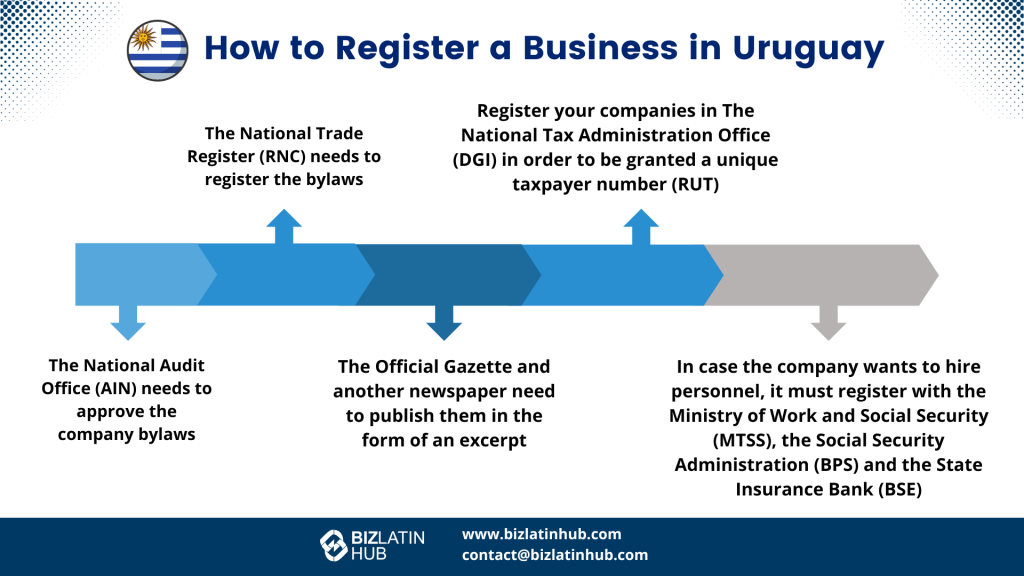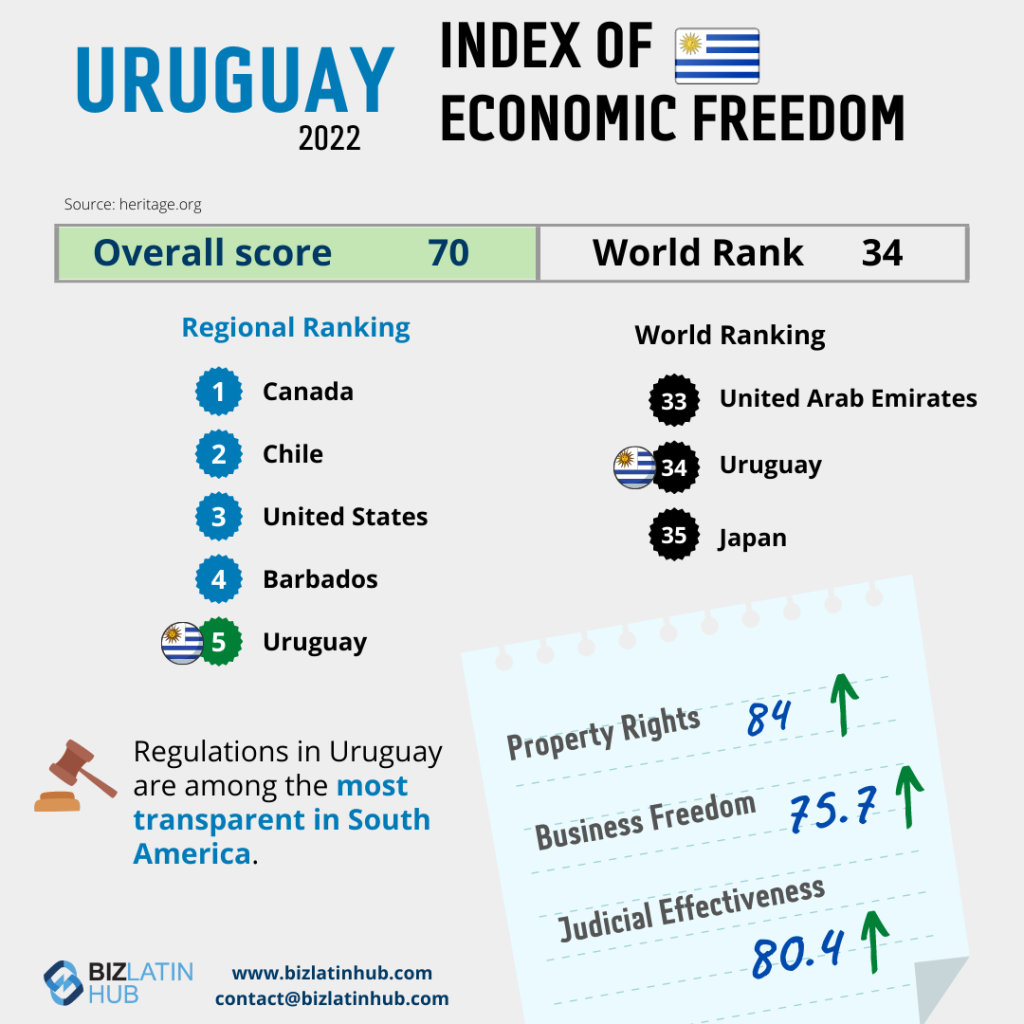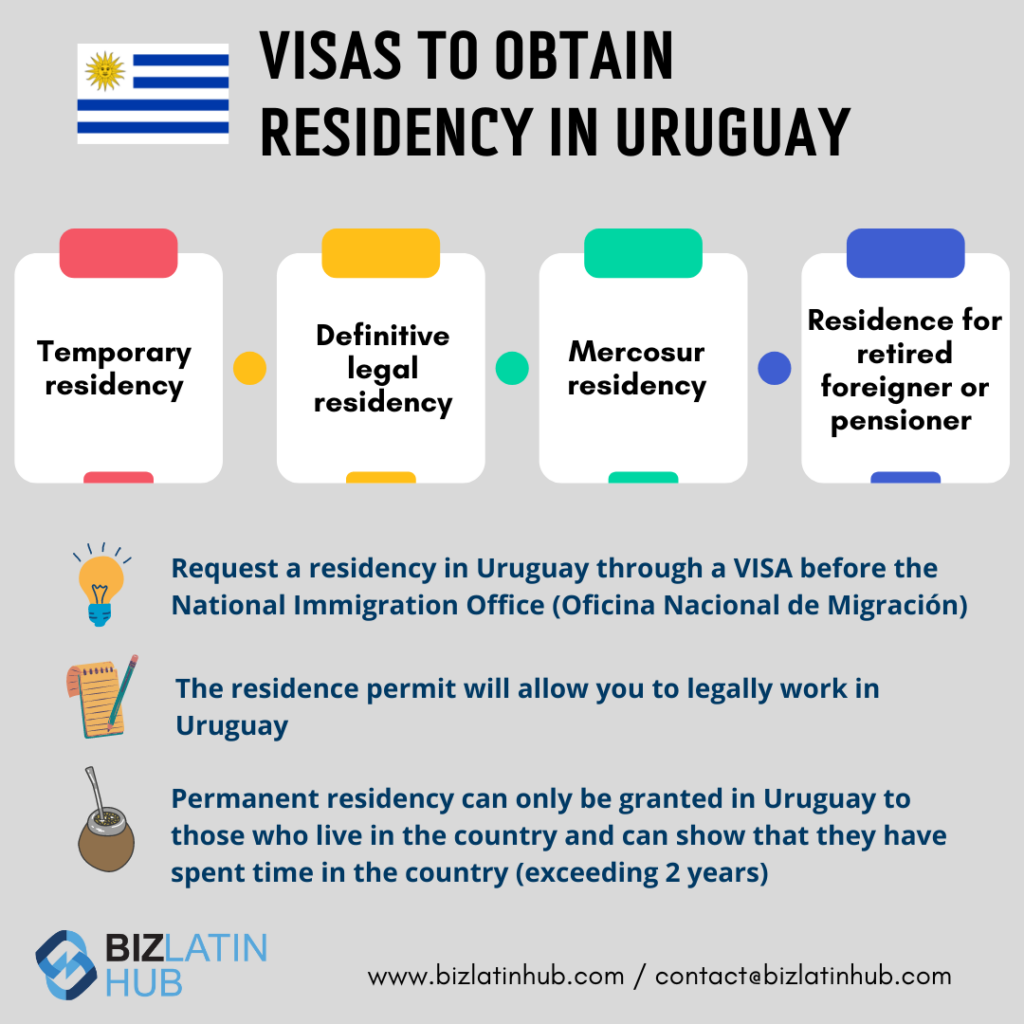To set up a business in Uruguay can be one of the best decisions when expanding your company in Latin America.
Although Uruguay is often overlooked because of its size, it is considered a progressive country in the region. With a gross domestic product (GDP) of $56.04 billion in 2019 (all figures in USD) and a GNI of $16,230 that same year, Uruguay is consider a high-income country by international standards. Extreme poverty is almost non-existent and its citizens enjoy a relatively high level of equality.
Uruguay is a strong advocate of free trades. Founder member of the Souther Common Market (Mercosur) it also has many Free trade agreements (FTAs) with various country all around the globe.
Top exports of the country are mainly agricultural, such as beef and chicken meet, dairy products and different type of crops. Its principal export destinations are its two neighbours Argentina and Brazil, but also the United States, China or the Netherlands.
If you are interested in entering the Uruguayan market, read on to learn the different steps of how to set up a business in Uruguay. Or, go ahead and reach out to us now to discuss your business options.

Table of Contents
Why set up a business in Uruguay?
The country has a diverse and mature business environment, positioning itself as one of the best countries to set up a business in Latin America. Furthermore, Uruguay’s economic activity is divided into three major sectors: agriculture, industry and services.
Primary and Secondary Sector
The largest field for exports is the agricultural sector, employing around 9% of the working population and contributing to 6% of the GDP. A major share in this rate is occupied by the fishing industry, livestock breeding (especially cattle) and food products, such as rice and wheat.
The industrial sector accounts for 25% of Uruguay’s GDP and employs more than 20% of the working population. The most important industrial fields are food processing of animals and agricultural products, very attractive industries for those investors who want to set up a business in Uruguay. Other important sectors include wine production and textile manufacturing.
Tertiary Sector
The most important sector in GDP terms is the service sector, contributing to 69% of the economic output and employing 71% of the working population in Uruguay.
The tourism service field exhibits the most important area of the tertiary sector in Uruguay. According to Carlos Fagetti, the director of National Tourism, “Uruguay is investing in the diversification of the tourism sector”. This kind of diversification seeks to stimulate the cultural sector in different cities of the country, increasing the opportunities to set up a business in Uruguay.
On the other hand, the financial system in Uruguay promotes foreign currency operations and a high amount of capital transactions. Furthermore, Uruguay’s stock market has been growing continuously in the last decade, especially because of its large primary stock market.
Legal entity types in Uruguay
Small- and medium-sized enterprises (SMEs) are the most important company types in Uruguay, with more than 170,000 SMEs providing jobs for 60% of the working population, according to the BBVA. But what are the types of legal entities investors need to consider to set up a business in Uruguay?
Corporation (Sociedad Anónima – S.A.)
There are two types of corporations:
- Open Corporation: companies that use public savings or have shares listed on the Montevideo Stock Exchange (BVM).
- Closed Corporation: have a limited number of shareholders and stocks are not traded publicly on the BVM.
Generally, an S.A. requires a minimum of two founding members to set up a business in Uruguay, who can be either residents or foreigners. In addition, management is mostly executed by a board of directors who can be local or foreign individuals domiciled inside or outside Uruguay. A considerable advantage of the SA is that there are no limitations to the activities that can be conducted except for financial and insurance operations.
Limited Liability Partnership (Sociedad de Responsibilidad Limitada – S.R.L.)
In Uruguay, an S.R.L. is usually employed by SME’s and it is, therefore, the most widely used entity type in the country. As it is the case for corporations, there are no limitations on activities to be conducted by the S.R.L. Likewise, it may have between a minimum of 2 to a maximum of 50 partners.

How to Register a Business in Uruguay
With the right support, the company formation process of an S.A. or an S.R.L. can be relatively quick and straightforward. No minimum amount of capital is needed, except for financial and insurance companies. Additionally, several steps to set up a business in Uruguay need to be taken:
Step 1: The National Audit Office (AIN) needs to approve the company bylaws.
Once you wrote the bylaws of your company, you need to validated them near the National Audit Office (AIN).
Step 2: The National Trade Register (RNC) needs to register the bylaws.
After the validation by the National Audit Office, you will need to bring your bylaws for registration to the National Trade Register (RNC)
Step 3: The Official Gazette and another newspaper need to publish them in the form of an excerpt.
The Registration of your Bylaws will be confirmed by being published one the Official Gazette
Step 4: Register your companies in The National Tax Administration Office (DGI) in order to be granted a unique taxpayer number (RUT).
Your Business is now nearly registered in Uruguay, but to start having commercial activity in compliance with local tax regulation, you will have to register your company in the National Tax Administration Office (DGI) to obtain your taxpayer number ( RUT)
Step 5: In case the company wants to hire personnel, it must register with the Ministry of Work and Social Security (MTSS), the Social Security Administration (BPS) and the State Insurance Bank (BSE).
From now your company is fully registered in Uruguay, but to start your commercial activity hiring personnel, you will have to register your company with the Different Work and Social administrations, Which are : the Ministry of Work and Social Security (MTSS), the Social Security Administration (BPS) and the State Insurance Bank (BSE).

Foreign Branch Office Registration
An alternative to forming an independent local company is the establishment of a foreign branch office in Uruguay. They are theoretically free to perform any business activities but usually follow the business strategy conducted by the parent company. Nevertheless, the company needs to be incorporated in order to conduct its operations.
The incorporation process is similar to the steps previously outlined and the foreign branch office needs to be registered in the National Trade Register (RNC) stating the parent company’s name, domicile, capital and its managers. Furthermore, registries in the MTSS, BPS and BSE are obligatory for the hiring of dependent employers to set up a business in Uruguay.
Looking for professional support to set up a business in Uruguay?
Uruguay possesses interesting business opportunities, for both small and large companies. Still, the incorporation process can be somewhat challenging without sufficient knowledge of local Uruguayan law or regulation.
To ensure that you successfully set up a business in Uruguay, it is recommended to work with a local group. Biz Latin Hub has the knowledge and expertise to offer personalized advice in Uruguay and Latin America. Don’t hesitate to contact us here for more specialized information regarding the company formation process.
Learn more about our team and expert authors.

The information provided here within should not be construed as formal guidance or advice. Please consult a professional for your specific situation. Information provided is for informative purposes only and may not capture all pertinent laws, standards, and best practices. The regulatory landscape is continually evolving; information mentioned may be outdated and/or could undergo changes. The interpretations presented are not official. Some sections are based on the interpretations or views of relevant authorities, but we cannot ensure that these perspectives will be supported in all professional settings.